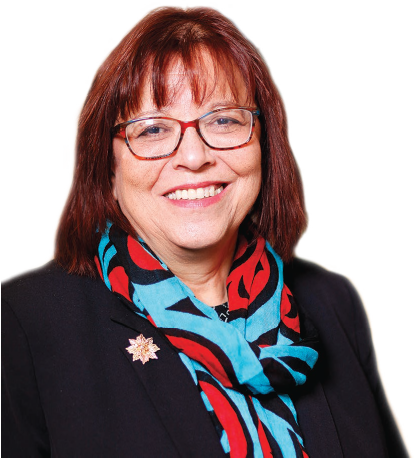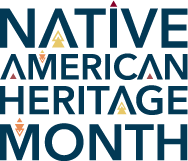Fall 2023
Circle of Hope
NATIVE EDUCATION:
An Investment in Our Future

 Inspiring change is one of the hardest things I feel called to do in this world. Seeing and understanding how to prioritize and choose where and how to make change is a daunting task, as it’s hard to figure out just where to start. For me, the strongest approach I see is to focus on education, and for my entire life I’ve always believed in exactly what our tagline says … “Education is the Answer.”
Inspiring change is one of the hardest things I feel called to do in this world. Seeing and understanding how to prioritize and choose where and how to make change is a daunting task, as it’s hard to figure out just where to start. For me, the strongest approach I see is to focus on education, and for my entire life I’ve always believed in exactly what our tagline says … “Education is the Answer.”
But sometimes, even with the focus of education, it’s hard to know where and how to invest our resources to make the biggest difference. As I’ve been reflecting on the things that are missing in our communities, one of the first things that comes to mind is financial resources – and with that, the knowledge and framework to build and manage those resources. During a time when many people would still like to erase us, is it wise to entrust those very people with helping us develop and grow our wealth?
While we have made a lot of progress, it is still not uncommon for Native nations to be taken advantage of by businesses with agendas not aligned with our own. It was a particularly painful experience for me when we recently completed a request for qualifications process for an investment partner. When we asked the larger companies to provide the number of Native Americans employed by their companies, they couldn’t answer, as Native Americans are not included in their employee data. It’s so discouraging to me to continue to be completely invisible when Native nations and businesses are contributing billions of dollars annually to their state and local economies.
This also speaks to the importance of education – particularly in finance and investment. And yet, very few Native people choose this specific career path. In keeping with the College Fund’s commitment to identifying needs and filling gaps, we are launching a new program/fellowship to provide opportunities for community leaders and members to learn more about finance and investment, including an Indigenous perspective. It is our intent to fund fellowships to inspire more Native people to invest in their financial/investment intelligence.
Specifically, we will be choosing up to four juniors or seniors who are currently working toward business or finance degrees and will fully fund their education through the completion of their MBA. In addition to scholarship funding, they will also receive support on their career journey to work in the field, incorporating their Indigenous knowledge in their work.
We will also be increasing our investment in broadbased scholarships for freshman and sophomores who are business and finance majors.
If there is ever to be a day when tribal nations are independent, thriving sovereign nations, managing our own financial resources is foundational. And because we live in a country that has an established monetary structure, we need to fully understand that structure and how we can best work within it, while also incorporating our Indigenous ways of knowing and being – and we need options that serve our communities and the specific needs of our people.
One of the biggest hurdles in achieving financial independence for individuals is grounded in historic poverty, including the shortage of stable, full-time jobs available in reservation communities. This leads to people working multiple part-time jobs at minimum wage. It is hard to secure credit (credit cards, car loans, etc.) without stable, fulltime employment; it is also challenging to establish credit without having credit, including owning a home. Many people are surprised to learn that a large percentage of tribal lands are held in trust by the U.S. Government, which means we are not allowed to actually own the land our homes are on, again making it difficult to establish a stable credit history and to build wealth through the appreciation of owned real estate.
I share these things to emphasize the importance of financial/investment knowledge growth for tribal nations and members to find ways to work within the existing system to achieve financial independence and achieve growth in accumulated wealth, both as nations and as individuals.
I would love to hear your thoughts about how the College Fund can support increasing financial/ investment intelligence in tribal communities. I invite you to send me your feedback and thoughts at prezcrazybull@collegefund.org. It will be helpful to hear from you as we begin building the fellowship program and engaging with students on this career path.
![]()
Did You Know?
- Native Americans have the highest percentage of people who are unbanked among all minority groups. Unbanked populations have the highest percentage of people without high school degrees and the lowest percentage of people with income higher than $25,000 annually.
- Forced migration created land issues and subsequent access to financial services, as most reservation locations are rural and sparsely populated, which doesn’t support financial institutions serving those areas.
- First-time Native American bankcard users are given credit limits that are 23.6% lower than people in other groups.
- In 2019 (most recent available data) Oklahoma tribes and tribal enterprises added $15.6 billion in direct contributions to the state’s economy.
- Native Americans are the largest users of store front lenders, pawn shops, and other expensive loan options.
- Typically, the underbanked end up with the lowest credit scores, which means they fall into the subprime category, making it difficult to secure credit with reasonable repayment terms.
Native American Heritage Month is Here!
Hard to believe November is here – and we are gearing up for a Native American Heritage Month filled with celebration, acknowledgement, education, and opportunity! Whatever your passion, we will have resources for you to leverage. Food, entertainment, music, dance, reading, writing, sharing – you think of it, we will most likely have a corresponding activity for you to enjoy not only in November, but all year long.
 Being recognized and acknowledged is SOOOOO important to our students, and an additional way to recognize and support them is to participate in Native American Heritage Month in some fashion. Please take a moment to check out the available resources at collegefund.org/nahm and choose something you enjoy while recognizing and valuing the cultures and traditions of the very important scholars you support!
Being recognized and acknowledged is SOOOOO important to our students, and an additional way to recognize and support them is to participate in Native American Heritage Month in some fashion. Please take a moment to check out the available resources at collegefund.org/nahm and choose something you enjoy while recognizing and valuing the cultures and traditions of the very important scholars you support!
Meet Randy, a Recent Haskell Indian Nations University Graduate!
Growing up, Randy saw first-hand his family’s experiences with both poverty and food insecurity. Addressing these challenges for his people is Randy’s motivator. While there are many pathways to change, the path Randy has chosen is investment banking/wealth management to help both his tribal government and individuals navigate the journey to financial security and independence.
Having just received his BBA from Haskell Indian Nations University, Randy is taking a gap year to gain hands-on exposure and experience in the financial industry to help prepare him for grad school. His commitment to his chosen career path stems from his observation and belief that it is critical for tribal nations and governments to be knowledgeable about financial choices and economic growth pathways – because to be truly sovereign nations, they must evolve economic development and achieve financial independence. Reliance on non-tribal entities to guide and advise tribal nations and governments in their financial choices does not always best serve tribal people.
While following his path, Randy also believes in and is excited by the opportunity to incorporate Indigenous ways of knowing and being into finance and wealth management, including receiving a scholarship to attend a summer course at Stanford to learn more about this. “In general, our Native ways of knowing aren’t really reflected anywhere in traditional finance and investment, so I’m really excited to learn more about this,” says Randy, “and having the ability to show up in this field as the Alaska Native person I am, with all my beliefs and values, will make me an even better person to serve my people and tribal nations.”

“Your emotional and financial support have helped me in completing my BBA degree, and I’m so grateful to you for that – and it makes me want to be and do better. I will always remember the way it feels to have that kind of support, especially as I look to the next step on my path to my goals. Thank you so much, and I look forward to making myself, my family, and you proud of what I do as I continue my journey to help tribal nations become thriving, financially independent nations.”
